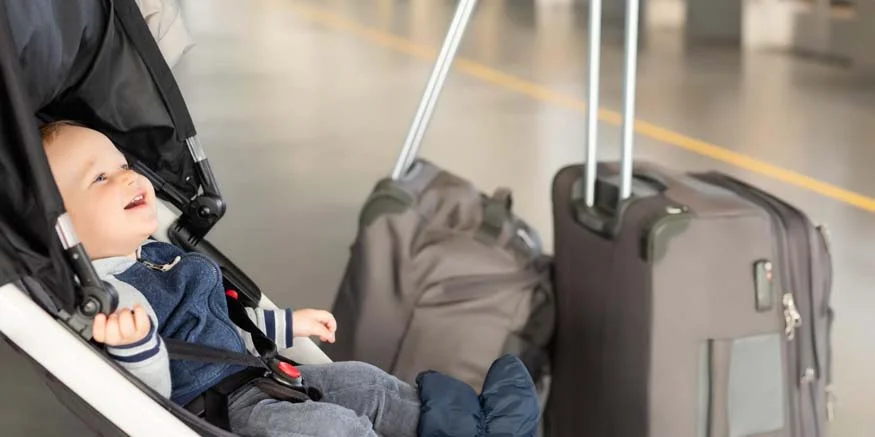Travelling with a baby for the first time can be both fun and difficult. If you are travelling by car, train, bus, or plane, planning is important for ensuring an easy and enjoyable experience for both you and your child. In this blog, we will learn essentials in infant travel lists and tips, necessary items, and precautions.
- Pre Planning:
- Research and Choose Baby Friendly Destinations:
- Flexible Itinerary:
- Health care:
- Essential Infant Travel Gear:
- Travel Safe Car Seat:
- Stroller:
- Portable Crib or Travel Bassinet:
- Diaper Bag:
- Feeding Essentials infant travel gear:
- Comfort Items:
- Baby Carrier:
- Safety Precautions:
- Childproof Accommodations:
- BabyProofing on the Go:
- Identification:
- Emergency Contacts:
- Newborn Traveling by Car:
- Car Seat Safety:
- Frequent Stops:
- Window Shades:
- Temperature Control:
- Newborn Traveling by Train:
- Comfortable Seating:
- Baby Friendly Carriages:
- Feeding on the Train:
- Plays:
- Stroller Accessibility:
- Noise Reduction:
- Newborn Traveling by Bus:
- Seating Choices:
- Stroller Friendly Buses:
- Changing Facilities:
- Feeding on the Bus:
- Infant Travel Essentials:
- Quiet Activities:
- Traveling with an infant on a plane
- Booking Direct Flights:
- Seat selection:
- Boarding:
- Feeding:
- Changing Facilities:
- Changing Diapers:
- Sleeping Arrangements:
- General Tips:
- Stay Calm and Flexible:
- Engage with Your Baby:
- Be Mindful of Others:
- Hydration and Snacks:
- Prioritise Safety:
- Document Important Information:
- Connect with Other Parents:
Before planning your trip, consider destinations that are baby-friendly, with amenities such as changing facilities and safe spaces for infants.
Make an adaptive schedule that takes into consideration your baby’s feeding, sleeping, and playing times. Expect more unexpected delays.
Before newborn travelling, discuss this with your paediatrician. Check your baby’s vaccination status and discuss any medical problems related to the trip.
If a newborn travelling by car, invest in a high-quality, travel-safe car seat appropriate for your baby’s age and weight. Ensure proper installation and familiarity with its features.
Carry a lightweight and portable stroller to make it easier to move in busy cities or airports.
For overnight stays, note a portable crib or travel bassinet in the infant travel list. Many options are easy to assemble and disassemble, providing a familiar sleep environment for your baby.
Diapers must be the first essential in the infant travel list. Remember to pack diapers, tissue paper, diaper covers for waste diapers, and rash cream, and take extra clothes in case of spills.
If breastfeeding, bring a nursing cover for privacy. For formula-fed babies, pack premeasured formula in a dispenser and extra bottles. If introducing solids, carry convenient, mess-free snacks.
Bring infant travel essentials such as a favorite blanket, and toys to make your baby more comfortable.
Note it in the infant travel list, a baby carrier for hands-free movement, especially in crowded areas or during activities where a stroller might be impractical.
If you are staying in a hotel, make sure the security for kids, such as connection covers and security officers.
Be vigilant about babyproofing when exploring new environments. Keep potentially hazardous items out of reach.
Carry identification for your baby, including a copy of their birth certificate. Take a recent photo in case of emergencies.
Create a list of emergency contacts, like your paediatrician’s phone number and the details of local medical facilities.
Also Read: Safety tips for students to follow during school trips
Install the car seat correctly and secure your baby properly. Use mirrors to keep an eye on your baby during the journey.
Plan frequent stops for diaper changes, feeding, and stretching. Use baby-friendly rest areas with changing facilities.
Use window shades to protect your baby from sunlight and ensure a comfortable environment for napping.
Check the temperature in the car and dress your baby with thick clothes for temperature control. Avoid too much exposure to AC.
Book a seat with sample space and consider reserving a family compartment if available.
Some trains have baby-friendly carriages with changing facilities. Research the train company’s amenities beforehand.
During breastfeeding, find a corner or use a cloth to cover feeding. For formula-fed babies, pack premeasured formula and bottled water.
Bring some favourite toys and books to keep the baby playing during the travel. Engage in interactive play when possible.
Check if the train allows strollers on board. Foldable strollers are convenient for navigating train platforms.
Bring noise-cancelling headphones to protect your baby’s ears from loud train noises.
Choose a bus with spacious seating or reserve seats with extra legroom for added comfort.
Confirm whether the bus company allows strollers on board. Foldable strollers are practical for bus travel.
Research if the bus has changing facilities. Be prepared to change diapers in designated areas during stops.
Follow similar feeding practices as on a train, ensuring privacy and comfort for both you and your baby.
Pack a compact bag with infant travel essentials, as bus space may be limited. Include snacks, diapers, wipes, and a change of clothes.
Bring quiet activities and toys to keep your baby entertained during the journey. Consider a travel-friendly activity mat.
Also Read: Educational Field Trips for Students
Travelling with an infant on a plane is tough. If possible minimise the travel time by booking a straight flight.
Select seats with extra legroom or consider purchasing an extra seat for added space.
Take advantage of early boarding to settle in and ensure a smooth change for your baby.
Ear pressure can be relaxed by feeding your baby during takeoff and landing. Breastfeeding or bottling can be calming.
Most planes have changing tables in the restrooms. Be prepared for tight spaces and changing your baby in a confined area.
Carry diaper changing kits to help with diaper changes during flight travel.
Sleeping is essential for newborns, take their comfortable blankets and toys for a nap.
Remain calm and flexible, as unexpected situations may arise. Babies can sense stress, so maintaining a positive attitude is key.
Interact and engage with your baby during the journey. Play peekaboo, sing songs, and provide comfort as needed.
Consider other travellers. If your baby becomes irritable apologise as well as comfort others.
Keep your baby hydrated and offer snacks to prevent hunger-related fussiness. Pack a variety of healthy snacks suitable for your baby’s age.
Follow all safety rules and regulations, use proper equipment, and frequently ensure that your baby is safe during travel.
Keep important documents, such as your baby’s health records and identification, organised and easily accessible.
If possible, connect with other parents who traveling with their children. Sharing experiences and tips can be useful and create a supportive environment.
Also Read: Healthy Snacks When Travelling With Babies
You can make the trip more comfortable and enjoyable for both people in a trip with careful planning, the infant travel essentials, and a positive attitude. Travel with care.
EuroSchool’s nursery class offers a nurturing environment for toddlers, fostering holistic development through play-based learning. With a seamless EuroSchool admission process, parents can ensure their child receives quality education and personalised attention. Enroll now!









